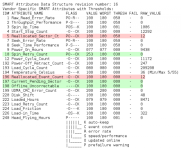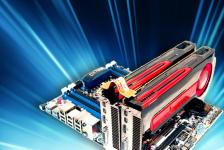On this forum you can submit full-featured reviews of your Linux-powered hardware with the help of automated reviews in the Linux Hardware Database.
Below on this page you can find notes from the author.
- Reviews — write complete reviews on your hardware (generate BBCode template first)
- Stories — write your hardware ownership/upgrade/etc stories
- Short reviews — write short reviews of your hardware here if you don't have much to say
- Everything — all other discussions
Below on this page you can find notes from the author.
The Linux Hardware Database at Linux-Hardware.org is the largest (Linux) database of hardware with 200.000+ configurations collected since 2014.
The database is grown by Linux users from all over the world with the help of hw-probe client application and dumped to our repositories on GitHub.
The database is grown by Linux users from all over the world with the help of hw-probe client application and dumped to our repositories on GitHub.
DIGMA Pro Fortis M DN15R5-ADXW07
HW: AMD Ryzen 5 7430U with Radeon Graphics, AMD graphics, memory module(s) 16GB, one drive (MAXIO Technology (Hangzhou) Ltd. NVMe SSD Controller MAP1202 512GB), 15.0-inch display.
Kernel: 6.12.34-6.12-alt1
PROBE ID
HW: AMD Ryzen 5 7430U with Radeon Graphics, AMD graphics, memory module(s) 16GB, one drive (MAXIO Technology (Hangzhou) Ltd. NVMe SSD Controller MAP1202 512GB), 15.0-inch display.
Kernel: 6.12.34-6.12-alt1
PROBE ID
Lenovo 333E (IdeaCentre Mini 01IRH8 90W2002CRM)
HW: Intel 13th Gen Core i5-13500H, Intel graphics, memory module(s) 16GB, 2 drives (ADATA Technology Co., Ltd. LEGEND 710 1024GB, Samsung Electronics Co Ltd MZVL4512HBLU-00BL7 512GB).
Kernel: 6.12.37_1
PROBE ID
HW: Intel 13th Gen Core i5-13500H, Intel graphics, memory module(s) 16GB, 2 drives (ADATA Technology Co., Ltd. LEGEND 710 1024GB, Samsung Electronics Co Ltd MZVL4512HBLU-00BL7 512GB).
Kernel: 6.12.37_1
PROBE ID
Eii Hampoo Reserved
HW: Intel Atom Processor E3950, Intel graphics, memory module(s) 6GB, 13.3-inch display and 46 more devices.
Kernel: 6.15.5-1-default
PROBE ID
HW: Intel Atom Processor E3950, Intel graphics, memory module(s) 6GB, 13.3-inch display and 46 more devices.
Kernel: 6.15.5-1-default
PROBE ID
ASRock Z690 AQUA OC
HW: Intel 13th Gen Core i5-13600KF, Nvidia graphics, 2 memory modules (2 x Crucial CP48G56C46U5.C16B 48GB), 5 drives (4 x Intel Corporation NVMe DC SSD [3DNAND, Sentinel Rock Controller] 4TB, Intel Corporation SSD 660P Series 1TB) and 59 more devices.
Kernel: 6.14.2-desktop-3omv2590
PROBE ID
HW: Intel 13th Gen Core i5-13600KF, Nvidia graphics, 2 memory modules (2 x Crucial CP48G56C46U5.C16B 48GB), 5 drives (4 x Intel Corporation NVMe DC SSD [3DNAND, Sentinel Rock Controller] 4TB, Intel Corporation SSD 660P Series 1TB) and 59 more devices.
Kernel: 6.14.2-desktop-3omv2590
PROBE ID
Fujitsu LIFEBOOK P727
HW: Intel Core i5-7200U CPU, Intel graphics, one memory module (Samsung M471A1K43BB0-CPB 8GB), one drive (SAMSUNG MZNTY256HDHP-00000 256GB SSD), 12.5-inch display and 34 more devices.
Kernel: 6.14.2-desktop-3omv2590
PROBE ID
HW: Intel Core i5-7200U CPU, Intel graphics, one memory module (Samsung M471A1K43BB0-CPB 8GB), one drive (SAMSUNG MZNTY256HDHP-00000 256GB SSD), 12.5-inch display and 34 more devices.
Kernel: 6.14.2-desktop-3omv2590
PROBE ID
Sony VGN-BX397XP
HW: Intel Core 2 CPU T7200, AMD graphics, 2 memory modules (2 x RAM Module 1GB), 2 drives (2 x FUJITSU MHV2160BT 160GB).
Kernel: 6.8.0-63-generic
PROBE ID
HW: Intel Core 2 CPU T7200, AMD graphics, 2 memory modules (2 x RAM Module 1GB), 2 drives (2 x FUJITSU MHV2160BT 160GB).
Kernel: 6.8.0-63-generic
PROBE ID
TOSHIBA Personal Computer System TEM130NE by TOPS (FAB-e67)
HW: Intel Core i7-2600 CPU, AMD graphics, 4 memory modules (2 x Micron 8JTF25664AZ-1G4D1 2GB, Samsung M378B5773CH0-CK0 2GB, Samsung M378B5773DH0-CH9 2GB), 2 drives (BORY R500 240G SSD, China SSD 128GB).
Kernel: 6.14.2-desktop-3omv2590
PROBE ID
HW: Intel Core i7-2600 CPU, AMD graphics, 4 memory modules (2 x Micron 8JTF25664AZ-1G4D1 2GB, Samsung M378B5773CH0-CK0 2GB, Samsung M378B5773DH0-CH9 2GB), 2 drives (BORY R500 240G SSD, China SSD 128GB).
Kernel: 6.14.2-desktop-3omv2590
PROBE ID
We've started to highlight most important SMART attributes in computer probes, that correlate with real mechanical failures according to Google and Backblaze studies.
Green highlights the zero value of important attributes, red — any positive value ...
Green highlights the zero value of important attributes, red — any positive value ...
A new project has been created to collect the list of computer hardware devices with poor Linux compatibility based on the Linux-Hardware.org data for 4 years.
There are about 26 thousands of depersonalized hwinfo reports in the repository from computers in various configurations (different kernels, OS — mostly ROSA Fresh). The device is included into the list of poorly supported devices if there is at least one user probe in which the driver for this device was not found. The column 'Missed' indicates the percentage of such probes. If number of such probes is small, it means that the driver was already added in newer versions of the OS. In this case we show minimal version of the Linux kernel in which the driver was present.
Devices are divided into categories. For each category we calculate the ratio of poorly supported devices to the total number of devices tested in this category.
At the moment, the study is limited only to PCI and USB devices. In the future, it is planned to include the rest.
Please check the presence of known unsupported devices in the table. The device ID can be taken from the output of the 'lspci -vvnn' command in square brackets, for example [1002:9851].
There are about 26 thousands of depersonalized hwinfo reports in the repository from computers in various configurations (different kernels, OS — mostly ROSA Fresh). The device is included into the list of poorly supported devices if there is at least one user probe in which the driver for this device was not found. The column 'Missed' indicates the percentage of such probes. If number of such probes is small, it means that the driver was already added in newer versions of the OS. In this case we show minimal version of the Linux kernel in which the driver was present.
Devices are divided into categories. For each category we calculate the ratio of poorly supported devices to the total number of devices tested in this category.
At the moment, the study is limited only to PCI and USB devices. In the future, it is planned to include the rest.
Please check the presence of known unsupported devices in the table. The device ID can be taken from the output of the 'lspci -vvnn' command in square brackets, for example [1002:9851].
A new open project has been created to estimate reliability of hard drives (HDD/SSD) in real-life conditions based on the SMART data collected in the Linux-Hardware.org database. The initial data (SMART reports), analysis methods and results are publicly shared in a new GitHub repository. Everyone can contribute to the report by uploading probes of their computers by the hw-probe tool!
The primary aim of the project is to find drives with longest "power on hours" and minimal number of errors. We use the following formula as a measure of reliability: Power_On_Hours / (1 + Number_Of_Errors), i.e. time to the first error/between errors.
Please be careful when reading the results table. Pay attention not only to the rating, but also to the number of checked model samples. If rating is low, then look at the number of power-on days and number of errors occurred. New drive models will appear at the end of the rating and will move to the top in the case of long error-free operation.
You can, as before, create a probe of your computer via the application in SimpleWelcome menu or from the console by a simple command:
hw-probe -all -upload
The primary aim of the project is to find drives with longest "power on hours" and minimal number of errors. We use the following formula as a measure of reliability: Power_On_Hours / (1 + Number_Of_Errors), i.e. time to the first error/between errors.
Please be careful when reading the results table. Pay attention not only to the rating, but also to the number of checked model samples. If rating is low, then look at the number of power-on days and number of errors occurred. New drive models will appear at the end of the rating and will move to the top in the case of long error-free operation.
You can, as before, create a probe of your computer via the application in SimpleWelcome menu or from the console by a simple command:
hw-probe -all -upload




